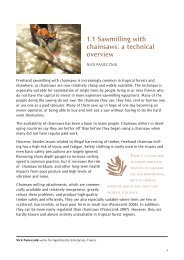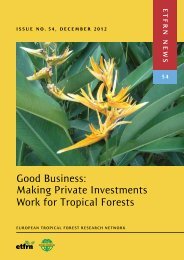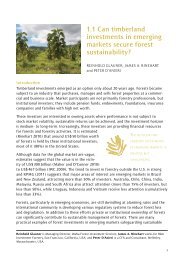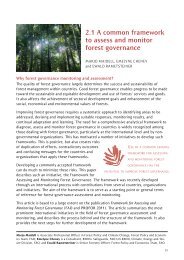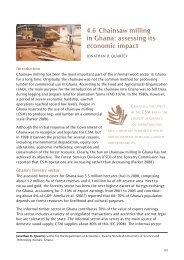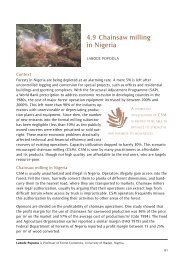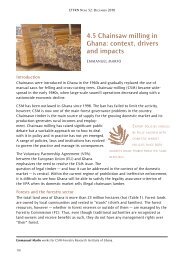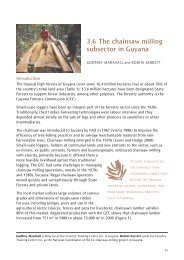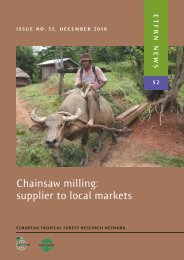Chainsaw milling: supplier to local markets - European Tropical ...
Chainsaw milling: supplier to local markets - European Tropical ...
Chainsaw milling: supplier to local markets - European Tropical ...
You also want an ePaper? Increase the reach of your titles
YUMPU automatically turns print PDFs into web optimized ePapers that Google loves.
3.7 chaiNsaw milliNg iN ThE caRibbEaN<br />
of unregulated deforestation became apparent, measures were taken <strong>to</strong> preserve the<br />
remaining forest cover. among the first steps was the definition of forest reserves: areas<br />
where trees and timber could be harvested, but the reserve itself remained under forest<br />
cover. rules and regulations on how <strong>to</strong> use the forests and the creation of a forest administration<br />
came in this period. management rules were defined <strong>to</strong> preserve the forest and<br />
regulate the use of forest resources by the <strong>local</strong> population. silvicultural systems, such<br />
as the temporary use of forests for agriculture, or the Trinidad shelterwood system were<br />
developed during this period.<br />
with the general decline of agriculture in the Caribbean, phase three is emerging.<br />
Following a general policy of trade liberalization, traditional agricultural exports, such as<br />
sugar and bananas, can no longer compete with world market prices. The salaries paid in<br />
the <strong>to</strong>urism industry are higher than those for agricultural labour; this contributes <strong>to</strong> the<br />
decline of agriculture. most Caribbean islands are now net importers of food.<br />
as a consequence, areas of agricultural land are increasingly<br />
abandoned. if these areas are not converted <strong>to</strong> alternative land<br />
uses, they naturally revert <strong>to</strong> secondary forest.<br />
The medium and large islands still produce some <strong>local</strong> timber; smaller<br />
islands produce negligible quantities of timber. all the Caribbean<br />
islands are net importers of forest products. it is difficult <strong>to</strong> get<br />
reliable data on in-country production, since the sec<strong>to</strong>r is very small.<br />
national production is believed <strong>to</strong> be less than 10% of each country’s<br />
wood requirements.<br />
since most of the forests are in mountainous areas they are important<br />
<strong>to</strong> protect the watershed protection and <strong>to</strong> safeguard the provision of<br />
water for domestic use, agriculture and industry. in the past, <strong>to</strong>urism<br />
in the Caribbean has been beach-oriented but an increasing number of<br />
<strong>to</strong>urists are showing an interest in eco<strong>to</strong>urism. many of the eco<strong>to</strong>urism attractions are in<br />
or around forest areas, which offers additional income opportunities for rural population.<br />
institutional and legal framework<br />
most of the forests in the English-speaking Caribbean islands are state owned. They<br />
are managed by forestry departments that in most cases are part of the ministry of<br />
agriculture. Traditionally, a person interested in buying trees approaches the <strong>local</strong> forestry<br />
officer. with the approval of the forestry officer trees are sold and released for harvest.<br />
in most countries governments set a fixed selling price per tree, also called royalty or<br />
stumpage. in many countries these stumpage fees are far below the price a private landowner<br />
would receive for selling a similar tree.<br />
most persons who purchase trees do not have industrial logging equipment; they fell the<br />
trees with chainsaws and use the same saw <strong>to</strong> convert them in<strong>to</strong> lumber on site. There are<br />
no additional fees or costs for converting the trees on site; all costs are included in the<br />
stumpage fee.<br />
99



